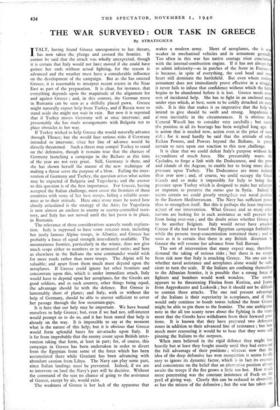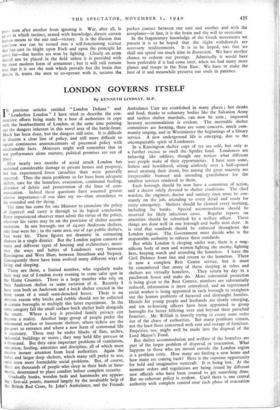THE WAR SURVEYED : OUR TASK IN GREECE
By STRATEGICUS
ITALY, having found Greece unresponsive to her. threats, has now taken the plunge and crossed the frontier. It cannot be said that the attack was wholly unexpected, though it is certain that Italy would not have moved if she could have gained her ends without actual fighting, for the season is advanced and the weather must have a considerable influence on the development of the campaign. But as she has entered Greece, it is reasonable to interpret recent events in the Near East as part of the preparation. It is clear, for instance, that everything depends upon the magnitude of the alignment for and against Greece ; and, in this context, the German move in Rumania can be seen as a skilfully placed pawn. Greece might naturally expect help from Turkey, and if Russia were to stand aside she might not wait in vain. But now it is reported that if Turkey moves Germany will at once intervene; and presumably she has made arrangements with Bulgaria not to place obstacles in her way.
If Turkey wished to help Greece she would naturally advance through Thrace; but she would face serious risks if Germany intended to intervene, since her line of advance would be directly threatened. Such a threat may compel Turkey to stand on the defensive, though it remains true that the chances of Germany launching a campaign in the Balkans at this time of the year are not very great. Still, Germany is there, and she has shown herself the master of the new technique of making a threat serve the purpose of a blow. Failing the inter- vention of Germany and Turkey, the question arises what action may be expected of Bulgaria and Yugoslavia; and the answer to this question is of the first importance. For Greece, having accepted the Italian challenge, must cover the frontiers of these countries with some of her best troops, failing a reliable assur- ance as to their attitude. Here once more must be noted how closely articulated is the strategy of the Axis; for Yugoslavia is now almost an enclave in enemy or enemy-controlled terri- tory, and Italy has not moved until the last pawn is in place, in Rumania.
The relevance of these considerations scarcely needs explana- tion. Italy is supposed to have some 200,000 men, including her justly famous Alpine troops, in Albania; and Greece has probably a force of equal strength immediately available. The mountainous frontier, particularly in the winter, does not give much scope either to numbers or to armoured units; and here as elsewhere in the Balkans the wise commander would wish for more roads rather than more troops. The Alpini will be valuable; and apart from them much must depend upon the aeroplanes. If Greece could ignore her other frontiers and concentrate upon this, which is under immediate attack, Italy would have to depend upon her aeroplanes, for the Greeks are good soldiers, and in such country, other things being equal, the advantage should lie with the defence. But Greece is lamentably short of planes; and Italy, with or without the help of Germany, should be able to muster sufficient to cover her passage through the few mountain-gaps.
It is here that our help may be important. We have bound ourselves to help Greece; but, even if we had not, self-interest would prompt us to do so, and it has been stated that help is already on the way. It is impossible to say at the moment what is the nature of this help; but it is obvious that Greece would form splendid bases for air-attacks upon Italy. It is far from improbable that the enemy count upon British inter- vention taking that form, at least in part; for, of course, this campaign in Greece has been undertaken in order to divert from the Egyptian front some of the force which has been accumulated there while Graziani has been advancing with abundant caution from Libya. The Navy can play some part, since Italian landings must be prevented. Indeed, if we are to intervene on land the Navy's part will be decisive. Without the command of the seas no chance of going to the assistance of Greece, except by air, would exist.
The weakness of Greece is her lack of the apparatus that makes a modern, army. Short of aeroplanes, she is etet weaker in mechanised vehicles and in armament generally Too often in this war has native courage tried conclusioni with the internal-combustion engine. If it has not always had to admit inferiority—as in patches of the front in France—i is because, in spite of everything, the cool head and stool heart still dominate the battlefield. But even where modern armament does not immediately prove effective in a struggle, it never fails to infuse that confidence without which the battl begins to be abandoned before it is lost. Greece needs every sort of incidental help. She has to fight in an enclosed arena under eyes which, at best, seem to be coldly detached on every side. It is this that makes it so imperative that the help we intend to give should be swift and strong. Impatience is almost inevitable in the circumstances. It is obvious that General Wavell has to consider very carefully ; but surely the position in all its bearings has b'een weighed long ago. It is action that is needed now, action even at the price of soap risk ; for it need hardly be said that the attitude of other Balkan Powers, and Powers beyond the Balkans, is pretty certain to turn upon our reaction to this new challenge.
It is clear that we could defeat Italy's purpose without the expenditure of much force. She presumably wants the Cyclades, to forge a link with the Dodecanese, and the ports and islands of the Aegean, to enable her to bring more direct pressure upon Turkey. The Dodecanese are more isolated than ever now ; and, of course, we could occupy the Greek islands and so make it impossible for Italy to bring that pressure upon Turkey which is designed to make her reluctant or impotent to preserve the status quo in Syria. Indeed it seems certain we could greatly strengthen our naval position in the Eastern Mediterranean. The Navy has sufficient power thus to strengthen itself. But this is perhaps the least important aspect of our intervention. What Greece and so many other nations are looking for is such assistance as will prevent her from being over-run ; and the doubt arises whether Greece is to be another Belgium. Italy would never have attacked Greece if she had not found the Egyptian campaign forbidding while the present troop-concentration remained there ; and as soon as it is certain that there is any British diversion to Greece she will resume her advance from Sidi Barrani.
The sort of intervention that many expect may, therefore, demand the taking of serious risks ; but there is no escape from risk now that Italy is attacking Greece. No one can say whether naval assistance and aeroplanes alone would be suffi- cient to turn the scale. If the Italians are confining themselves to the Albanian frontier, it is possible that a strong force of fighters and bombers would work wonders. The enemy appears to be threatening Florina from Koritza, and Janina from Argyrokastro and Leskovik ; but it should not be difficult to contain those attacks. The one real present advantage of the Italians is their superiority in aeroplanes, and if they would only continue to bomb towns behind the front Greece might be able to pin them to the frontier. The one ambiguous note in the all too scanty news about the fighting is the state- ment that the Greeks have withdrawn from their forward posi- tions. It is known that they have prenared two defensive zones in addition to their advanced line of. resistance ; but bow much more reassuring it would be to hear that they were still pinning the Italians to. the outposts. When men believed in the rigid defence they might lose heavily but at least they fought stoutly until they had extracted the full advantage of their positions ; whereas now that the idea of the deep defensive has won recognition it seems fatally easy to ignore its dynamic factor, which is in fact its essence, and concentrate on the belief that an alternative position always awaits the troops if the fire grows a little too hot. How mach more penetrating was the constant insistence of Foch on the peril of giving way. Clearly this can be reduced to absurdity, as has the misuse of the defensive ; but the war has taken one grave turn after another from ignoring it. War, after all, is an art in which instinct, armed with knowledge, directs certain human means to the one end—victory. It is the illusion that somehow war can be turned into a self-functioning science that has cast its blight upon Foch and upon the principle he stood for—that battles are won by fighting. Clearly an army should not be placed in the field unless it is provided with the most modern form of armament ; but it will still remain true that it is not the tank which prevails but the brain that directs it, trains the men to co-operate with it, secures the perfect contact between one unit and another and with the aeroplanes—in fine, it is the brain and the will to overcome.
In the fragmentary knowledge of the Greek movements we possess it is to be hoped that the slight withdrawals are necessary readjustments. It is to be hoped, too, that we shall not spend too much time in discussion. We have another chance to redeem our prestige. Admittedly it would have been preferable if it had come later, when we had many more planes and troops in the Near East. We have to make the best of it and meanwhile preserve our souls in patience.







































 Previous page
Previous page